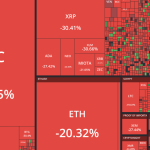There’s been a veritable explosion of cryptocurrencies over the last few years. One of the main reasons for this rise in digital currencies is a desire by individuals to take economic power away from central banks, national governments, and giant corporations and give it back to the people. Once scoffed at by many institutions, cryptocurrency is finding ways to integrate into the real sector of economic systems through various payment means. Some cryptocurrencies are more successful than others, but they each represent a new and decentralized economic ecosystem.
Cryptocurrency Has to Be Useful
Many forms of cryptocurrency have been created by various groups and entities, and each of them has sought a way to integrate themselves into economic real sectors. Such an endeavor is a must as a cryptocurrency has to have real world worth and usefulness in order to be successful. Of course, each cryptocurrency has their own unique challenges and advantages, but the constant use of the differing cryptocurrencies helps bolster the real world and digital economies.
Bitcoin is the most well-known cryptocurrency and garners daily headlines. It’s currently riding an amazing steak of gaining in value, recently reaching $14,000 per bitcoin. The major advantages of Bitcoin is that it’s extremely well known and an incredible amount of people from around the world use it to purchase everyday items or receive services. However, many governments are looking hard at Bitcoin, and the coin’s assumed privacy is not as powerful as many believe. This can be seen by the recent court case where the US government got a major exchange to hand over data from thousands of user accounts to look for tax dodgers. Bitcoin also consumes a great deal of energy for every transaction, and the transaction fees continue to rise, putting a dampener on economic growth.
Dash is another popular cryptocurrency that utilizes a two-tier network. Instead of just having miners, like other cryptocurrencies, Dash has miners (who create new blocks) and masternodes. These masternodes provide for the currency’s vital functions, such as sending currency. Dash provides for greater privacy than Bitcoin, and its InstantSend service allows for near-instant transactions while also removing the double-spending problem that has plagued other cryptocurrencies. Speed is vital for economic, and very private, transactions carried out by Dash, which has led to the digital currency gaining in popularity. However, the increasing centralization of Dash mining has led to some negative repercussions, such as the coin’s economy, and Dash has been increasingly exploited by ASIC manufacturers.
Giving Economic Power Back to the People
One of the primary benefits of cryptocurrency is that it gives individuals a lot more control over their financial life than they previously enjoyed. A central government exercises tremendous control over the economy, such as backing specific currencies and deciding how much of said currencies to keep in circulation. Corporations and banks also exercise control by determining who has access to capital and what forms of payment will be allowed within the system. Cryptocurrency creates an entirely new economic ecosystem that lies outside the control of banks, central governments, and massive corporations. The average person can market their goods and services on their own terms, and the vast amount of exchanges allows individuals to use the digital currencies that they’re most comfortable with.
There are certain cryptocurrencies that almost never hit headlines when it comes to their implementation in real life. However, their lack of worldwide popularity doesn’t mean they aren’t used.
Sibcoin, for example, was born in Siberia and is based off a fork in the Dash blockchain. It’s goal is to make the blockchain accessible to everyone and provide an economic unit that is not impacted by corrupt governments or financial institutions. It shares many of the same features as Dash, but Sibcoin does have some unique traits that have led it to becoming a digital currency of choice in Eastern Europe and is even moving into China. Sibcoin is ASIC-resistant through the use of the Streebog hashing algorithm, which increases decentralization while maintaining the highest levels of security. To help stimulate economic activity, the coin features very low transaction fees. Sibcoin takes privacy very seriously and features an anonymous transaction system that has yet to be broken. Sibcoin holders can also use the Perevod.io service that allows parties to send fiat currency to each other without the need for any cryptocurrency experience.
Scotcoin is another national cryptocurrency that was created to give the people of Scotland the opportunity to become familiar with the digital technology, not to mention a means of becoming independent of the British pound and the euro. Scotcoin does power economic activity by featuring low processing fees and very fast peer-to-peer transactions, and it has built up a sizable network of businesses who accept it. However, the Brexit vote has thrown the entire UK into a political quandary, and Scotcoin is a non-profit, which does hamper the normal economic incentive of maximizing profit potential. Scotcoin’s value has remained low, and the coin is essentially localized in Scotland.
Even more localized than the Scotcoin is the Liverpool Local Pound. This cryptocurrency is part of the Colu network that’s designed to boost the economies of specific cities, which happens to be Liverpool, England, in this particular case. The focus of this coin is on keeping the control of money in the average citizen’s hands. The Liverpool Local Pound has been proven to be a popular choice over standard credit cards as there are no transaction fees involved, which saves a local business a nice chunk of change. About 200 businesses in Liverpool accept this cryptocurrency, and Colu has localized coins for London, Haifa, and Tel Aviv as well.
Another interesting digital currency is BioCoin. This particular coin is used to promote organic farming and sustainable practices and is already used by a good number of farmers in Russia as payment. The coin’s reach extends to other businesses as well that lie outside of the food/farming ecosystem, with over 50 businesses being part of the network, such as Jour de Spa, Men’s Studio, and Zhitz Distillery.
Just like the real world, the circulation of cryptocurrency is vital to economic health and growth. A number of digital currencies (Bitcoin, Dash, and Sibcoin) continue to expand in number and value, thus pushing the economic envelope in both the digital and real worlds. Both Dash and Sibcoin offer superior privacy protection compared to Bitcoin, and each coin has an invested community behind it. The most important economic factor of cryptocurrency is that the individual, and not the state or corporation, makes the financial decisions that impact them. Thus, cryptocurrencies, no matter their advantages or flaws, do help put economic power back into the hands of the average person.
















Add Comment